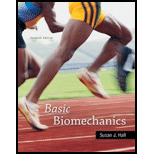
Basic Biomechanics
7th Edition
ISBN: 9780073522760
Author: Susan J Hall
Publisher: McGraw-Hill Education
expand_more
expand_more
format_list_bulleted
Concept explainers
Question
Chapter 5, Problem 4IP
Summary Introduction
To explain: The reason why athletes’ joints are often taped before the athletes participate in an activity.
Concept introduction: Athletic tape also known as sports tape is an adhesive tape applied to the skin by sportsmen and athletes during their sport activity. It is used to provide support and protection to maintain bones and muscles in a stable position.
Summary Introduction
To determine: The possible advantages and disadvantages of taping.
Concept introduction: Athletic tape also known as sports tape is an adhesive tape applied to the skin by sportsmen and athletes during their sport activity. It is used to provide support and protection to maintain bones and muscles in a stable position.
Expert Solution & Answer
Want to see the full answer?
Check out a sample textbook solution
Chapter 5 Solutions
Basic Biomechanics
Ch. 5 - Prob. 1IPCh. 5 - Describe the directions and approximate ranges of...Ch. 5 - Prob. 3IPCh. 5 - Prob. 4IPCh. 5 - What factors contribute to flexibility?Ch. 5 - Prob. 6IPCh. 5 - How is flexibility related to the likelihood of...Ch. 5 - Prob. 8IPCh. 5 - Explain why grip strength diminishes as the wrist...Ch. 5 - Why is ballistic stretching contraindicated?
Ch. 5 - Prob. 1APCh. 5 - How is articular cartilage similar to and...Ch. 5 - Prob. 4APCh. 5 - Discuss the relative importance of joint stability...Ch. 5 - What specific exercises would you recommend for...Ch. 5 - What specific exercises would you recommend for...Ch. 5 - Prob. 8APCh. 5 - Prob. 9APCh. 5 - What exercises would you recommend for senior...
Knowledge Booster
Learn more about
Need a deep-dive on the concept behind this application? Look no further. Learn more about this topic, bioengineering and related others by exploring similar questions and additional content below.Similar questions
- Briefly define the types of joint movements available at a ball-and-socket joint.arrow_forwardThe specialized soft-tissue manipulation technique used to ease the pain of conditions such as fibromyalgia, movement restrictions, and temporomandibular joint disorders is known as ____________________________ myofascial release occupational therapy RICE therapeutic ultrasoundarrow_forwardWhich statement is tine concerning the knee joint? The lateral meniscus is an intrinsic ligament located on the lateral side of the knee joint. Hyperextension is resisted by the posterior cruciate ligament. The anterior cruciate ligament supports the knee when it is flexed and weight bearing. The medial meniscus is attached to the tibial collateral ligament.arrow_forward
- Movement at the shoulder joint that moves the upper limb laterally away from the body is called ________. elevation eversion abduction lateral rotationarrow_forwardFigure 38.37 Which of the following statements about muscle contraction is true? The power stroke occurs when ATP is hydrolyzed to ADP and phosphate. The power stroke occurs when ADP and phosphate dissociate from the myosin head. The power stroke occurs when ADP and phosphate dissociate from the actin active site. The power stroke occurs when Ca2+ binds the calcium head.arrow_forwardYou are training athletes for the 100-meter dash. They need muscles specialized for speed and strength, not endurance. What muscle characteristics would your training regimen aim to develop? How would you alter it to train a long-distance swimmer?arrow_forward
- What is a joint?arrow_forwardDefine how joints are classified based on function. Describe and give an example for each functional type of joint.arrow_forwardWatch this video (http://openstaxcollege.org/l/anatomical) to learn about anatomical motions. What motions involve increasing or decreasing the angle of the foot at the ankle?arrow_forward
- Watch this animation (http://openstaxcollege.org/l/hipreplace) to observe hip replacement surgery (total hip arthroplasty), which can be used to alleviate the pain and loss of joint mobility associated with osteoarthritis of the hip joint. What is the most common cause of hip disability?arrow_forwardWatch this video (http://openstaxcollege.org/l/flexext) to learn more about the flexion and extension of the knee, as the femur both rolls and glides on the tibia to maintain stable contact between the bones in all knee positions. The patella glides along a groove on the anterior side of the distal femur. The collateral ligaments on the sides of the knee become tight in the fully extended position to help stabilize the knee. The posterior cruciate ligament supports the knee when flexed and the anterior cruciate ligament becomes tight when the knee comes into full extension to resist hyperextension. What are the ligaments that support the knee joint?arrow_forwardWatch this video (http://openstaxcollege.org/l/anklejoint3) to learn about the ligaments of the ankle joint, ankle sprains, and treatment. During an inversion ankle sprain injury, all three ligaments that resist excessive inversion of the foot may be injured. What is the sequence in which these three ligaments are injured?arrow_forward
arrow_back_ios
SEE MORE QUESTIONS
arrow_forward_ios
Recommended textbooks for you
- Lifetime Physical Fitness & WellnessHealth & NutritionISBN:9781337677509Author:HOEGERPublisher:Cengage
 Principles Of Radiographic Imaging: An Art And A ...Health & NutritionISBN:9781337711067Author:Richard R. Carlton, Arlene M. Adler, Vesna BalacPublisher:Cengage Learning
Principles Of Radiographic Imaging: An Art And A ...Health & NutritionISBN:9781337711067Author:Richard R. Carlton, Arlene M. Adler, Vesna BalacPublisher:Cengage Learning Human Physiology: From Cells to Systems (MindTap ...BiologyISBN:9781285866932Author:Lauralee SherwoodPublisher:Cengage Learning
Human Physiology: From Cells to Systems (MindTap ...BiologyISBN:9781285866932Author:Lauralee SherwoodPublisher:Cengage Learning

Lifetime Physical Fitness & Wellness
Health & Nutrition
ISBN:9781337677509
Author:HOEGER
Publisher:Cengage




Principles Of Radiographic Imaging: An Art And A ...
Health & Nutrition
ISBN:9781337711067
Author:Richard R. Carlton, Arlene M. Adler, Vesna Balac
Publisher:Cengage Learning

Human Physiology: From Cells to Systems (MindTap ...
Biology
ISBN:9781285866932
Author:Lauralee Sherwood
Publisher:Cengage Learning